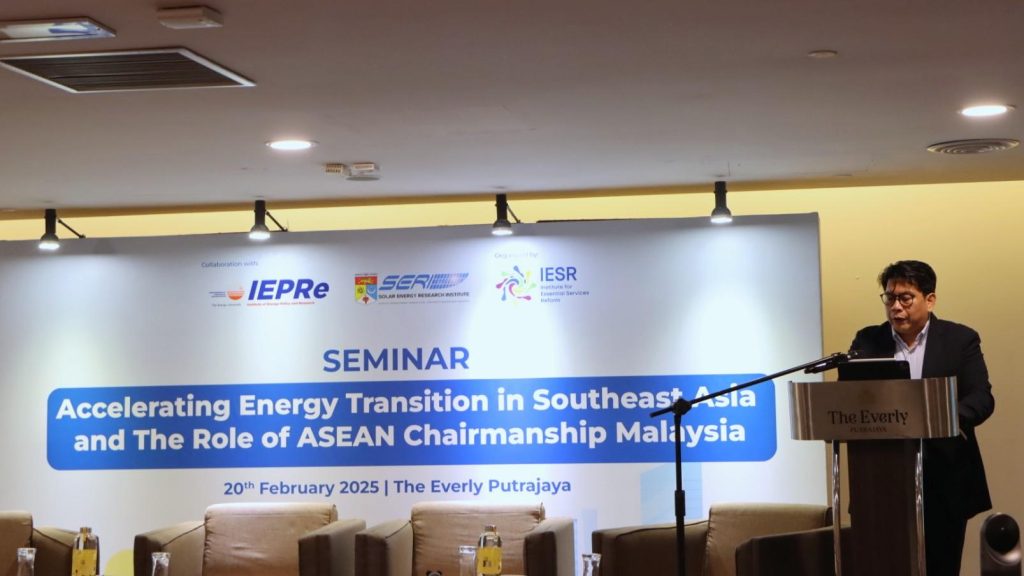
Jakarta – Without strong policy interventions, Southeast Asian countries are predicted to remain 75 per cent dependent on fossil fuels in the coming decades, according to a study by the Institute for Essential Services Reform (IESR), Thursday, February 20. This reliance risks exacerbating carbon emissions, increasing energy costs, and hampering efforts to transition to clean and sustainable energy.
IESR Executive Director Fabby Tumiwa, revealed that although ASEAN is the world’s fastest growing economic region, the energy transition is still slow. The share of renewable energy in ASEAN’s total primary energy supply currently stands at only 15.6 percent, far from the target of 23 percent by 2025.
“Without significant policy changes, fossil fuels will continue to dominate and supply up to 75 per cent of ASEAN’s energy needs. This has a major impact, not only on increasing carbon emissions, but also on energy security and economic stability in the region,” Fabby said at the seminar “Accelerating Energy Transition in Southeast Asia and the Role of ASEAN Chairmanship Malaysia” held in Putrajaya, Malaysia.
According to IESR data, ASEAN countries spent more than USD 130 billion on oil imports by 2023, almost four times the total investment in renewable energy. Fossil fuel subsidies also continue to rise and reached over USD 105 billion in 2022. In fact, without policy changes, ASEAN is predicted to become a net importer of natural gas by 2027, with fossil fuel import expenditure that could reach more than USD 140 billion by 2030.
“This situation further worsens ASEAN’s position in facing global energy challenges. If it continues to rely on fossil fuels without a clear transition strategy, energy costs will become more expensive, state budgets will become more burdened, and geopolitical risks will increase,” Fabby added.
To address these challenges, IESR proposes an ASEAN Energy Transformation Agenda that rests on four main pillars. First, accelerate clean energy development and integration by establishing the ASEAN Just Energy Transition Partnership (ASEAN-JETP), which has the potential to unlock funding of up to USD 130 billion per year until 2030. Second, make ASEAN a clean energy manufacturing hub by attracting more than USD 100 billion in investments in solar energy, electric vehicles, batteries, wind turbines, and green hydrogen. Third, strengthen green investment through the expansion of the ASEAN green taxonomy and the issuance of green bonds. Fourth, improve policy coordination and workforce development by establishing the ASEAN Clean Energy Workforce Initiative, which is projected to create more than 3 million jobs in the clean energy sector.
Dr Norasikin Ahmad Ludin, Deputy Director of the Solar Energy Research Institute (SERI) at Universiti Kebangsaan Malaysia, emphasized that ASEAN is at a crucial juncture with rising energy demand and the urgency of climate change mitigation.
“Malaysia as the 2025 ASEAN Chair has a strategic opportunity to lead clean energy integration in the region. With the right policies, ASEAN can become a competitive hub for renewable energy innovation and development,” he said.
Meanwhile, Dr Nora Yusma Binti Mohamed Yusoff, Director of the Institute of Energy Policy and Research (IEPRe), highlighted the importance of technological transformation in supporting the energy transition.
“ASEAN must start moving from dependence on foreign technologies to developing clean energy technologies independently. In addition, green trade policies need to be designed to reduce the impact of carbon emissions and ensure sustainable economic development in the region,” he explained.
With the challenges mounting, experts agree that the energy transition in ASEAN requires concrete steps and more ambitious policies. Otherwise, high dependence on fossil fuels will continue to be a major obstacle to sustainable economic growth in the region. (Hartatik)















